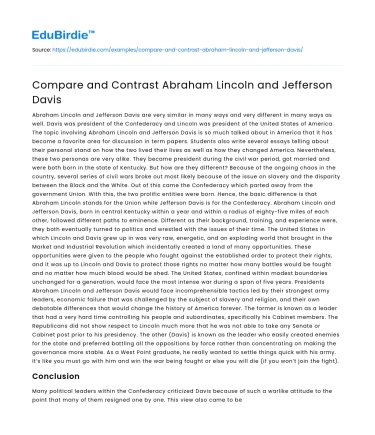Abraham Lincoln and Jefferson Davis are very similar in many ways and very different in many ways as well. Davis was president of the Confederacy and Lincoln was president of the United States of America.
The topic involving Abraham Lincoln and Jefferson Davis is so much talked about in America that it has become a favorite area for discussion in term papers. Students also write several essays telling about their personal stand on how the two lived their lives as well as how they changed America. Nevertheless, these two personas are very alike. They became president during the civil war period, got married and were both born in the state of Kentucky. But how are they different?
Save your time!
We can take care of your essay
- Proper editing and formatting
- Free revision, title page, and bibliography
- Flexible prices and money-back guarantee
Because of the ongoing chaos in the country, several series of civil wars broke out most likely because of the issue on slavery and the disparity between the Black and the White. Out of this came the Confederacy which parted away from the government Union. With this, the two prolific entities were born. Hence, the basic difference is that Abraham Lincoln stands for the Union while Jefferson Davis is for the Confederacy.
Abraham Lincoln and Jefferson Davis, born in central Kentucky within a year and within a radius of eighty-five miles of each other, followed different paths to eminence. Different as their background, training, and experience were, they both eventually turned to politics and wrestled with the issues of their time. The United States in which Lincoln and Davis grew up in was very raw, energetic, and an exploding world that brought in the Market and Industrial Revolution which incidentally created a land of many opportunities. These opportunities were given to the people who fought against the established order to protect their rights, and it was up to Lincoln and Davis to protect those rights no matter how many battles would be fought and no matter how much blood would be shed. The United States, confined within modest boundaries unchanged for a generation, would face the most intense war during a span of five years. Presidents Abraham Lincoln and Jefferson Davis would face incomprehensible tactics led by their strongest army leaders, economic failure that was challenged by the subject of slavery and religion, and their own debatable differences that would change the history of America forever.
The former is known as a leader that had a very hard time controlling his people and subordinates, specifically his Cabinet members. The Republicans did not show respect to Lincoln much more that he was not able to take any Senate or Cabinet post prior to his presidency. The other (Davis) is known as the leader who easily created enemies for the state and preferred battling all the oppositions by force rather than concentrating on making the governance more stable. As a West Point graduate, he really wanted to settle things quick with his army. It’s like you must go with him and win the war being fought or else you will die (if you won’t join the fight).
Conclusion
Many political leaders within the Confederacy criticized Davis because of such a warlike attitude to the point that many of them resigned one by one. This view also came to be contested by many of his cabinet members.
Lincoln had conflicts with the senate whereas Davis also got irked easily by Alexander Stephens, his vice president who has a completely different ideal and personality. Lincoln also showed blatant disrespect to the Supreme Court (SC) and the Constitution in several instances like when he increased his military size by his own approval and how he disregarded the SC’s ruling to release their captured enemies.
On the brighter side, Lincoln was dubbed as an effective president despite his lack of military experience. But Davis was seen as having the greater inclination of becoming a leader because of his exposure as a public speaker and his knowledge in public affairs ‘“ something that Lincoln lacked.






 Stuck on your essay?
Stuck on your essay?

